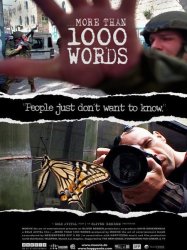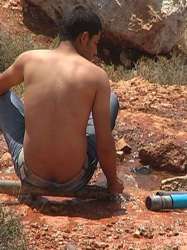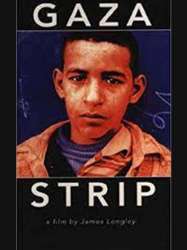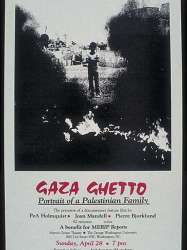Promises is a american film of genre Documentary directed by Justine Shapiro released in USA on 15 march 2002
Promises (2001)

If you like this film, let us know!
- Infos
- Casting
- Technical infos
- Photos
- Videos
- Film quotes
- Characters
- Music
- Awards
Released in USA 15 march 2002
Length 1h46
OriginUSA
Genres Documentary
Themes Films set in Africa, Films about children, Films about religion, Documentary films about law, Documentary films about war, Documentary films about historical events, Documentaire sur une personnalité, Documentary films about politics, Documentary films about religion, Political films, Films about Jews and Judaism
Rating82%










Promises is a 2001 documentary film that examines the Israeli-Palestinian conflict from the perspectives of seven children living in the Palestinian communities in the West Bank and Israeli neighborhoods of Jerusalem.
The film follows Israeli-American filmmaker B.Z. Goldberg as he meets with seven Palestinian and Israeli children between the ages of nine and thirteen, seeing the Middle East conflict through their eyes. The most important aspect of the film is that it allows "ordinary" kids to develop natural bonds of affection by simply playing games with each other - bonds which go beyond the clutter of prejudices that they have heard from their parents and others around them.
Promises was shot between 1997 and 2000 and was produced in association with the Independent Television Service with partial funding provided by the Corporation for Public Broadcasting.
The film has a running time of 106 minutes, and includes Arabic, Hebrew and English dialogue with English subtitles.
In 2004 the filmmakers' produced a follow-up program called Promises: Four Years On, which features interviews and updates on the children's current lives. It lasts 25 minutes and is included as a special feature on the film's DVD release.
Promises has been shown at many film festivals and received excellent reviews and many accolades.
Synopsis
Ce film documentaire donne la parole à sept enfants juifs et palestiniens, âgés entre 9 et 13 ans. Ils donnent leur vision sur le conflit israélo-palestinien.Comments
Leave comment :
Suggestions of similar film to Promises
There are 2 films with the same director, 8962 with the same cinematographic genres, 14980 films with the same themes (including 0 films with the same 11 themes than Promises), to have finally 70 suggestions of similar films.If you liked Promises, you will probably like those similar films :

...More Than 1000 Words (2006)
, 1h18Origin Israel
Genres Documentary
Themes Films set in Africa, Films about religion, Documentary films about the visual arts, Documentary films about law, Documentary films about war, Documentary films about historical events, Documentaire sur une personnalité, Documentary films about politics, Documentary films about religion, Political films, Films about Jews and Judaism
Actors Galit Gutmann
Rating74%






Interrupted Streams (2010)
, 1h15Origin Israel
Genres Documentary
Themes Films set in Africa, Environmental films, Films about religion, Documentary films about law, Documentary films about environmental issues, Documentary films about war, Documentary films about historical events, Documentaire sur une personnalité, Documentary films about politics, Documentary films about religion, Political films, Films about Jews and Judaism
Paths of lives are crossed in one village in the West Bank. Along the broken water pipelines, villagers walk on their courses towards an indefinite future. Israel that controls the water, supplies only a small amount of water, and when the water streams are not certain nothing can evolve. The control over the water pressure not only dominates every aspect of life but also dominates the spirit. Bil-in, without spring water, is one of the first villages of the West Bank where a modern water infrastructure was set up. Many villagers took it as a sign of progress, others as a source of bitterness. The pipe-water was used to influence the people so they would co-operate with Israel’s intelligence. The rip tore down the village. Returning to the ancient technique of collecting rainwater-using pits could be the villagers’ way to express independence but the relations between people will doubtfully be healed.

The Main Suspect (2003)
, 1hDirected by Yaky Yosha
Genres Documentary
Themes Films set in Africa, Films about religion, Documentary films about law, Documentary films about war, Documentary films about historical events, Documentaire sur une personnalité, Documentary films about politics, Documentary films about religion, Political films, Films about Jews and Judaism

Arab-Israeli Dialogue (1974)
, 40minutesDirected by Lionel Rogosin
Origin USA
Genres Documentary
Themes Films set in Africa, Films about religion, Documentary films about law, Documentary films about war, Documentary films about historical events, Documentaire sur une personnalité, Documentary films about politics, Documentary films about religion, Political films, Films about Jews and Judaism

Rachel (2009)
, 1h40Directed by Simone Bitton
Origin France
Genres Documentary
Themes Films set in Africa, Films about religion, Documentary films about law, Documentary films about war, Documentary films about historical events, Documentaire sur une personnalité, Documentary films about politics, Documentary films about religion, Political films, Films about Jews and Judaism
Rating74%





Le 16 mars 2003, au sud de la bande de Gaza, Rachel Corrie, jeune Américaine pacifiste bénévole au sein de l'International Solidarity Movement, meurt écrasée par un bulldozer de l'armée israélienne alors qu'elle tentait de s'opposer à la destruction de maisons palestiniennes. Le documentaire est conçu comme une enquête, à l'aide d'entretiens télévisés, d'images militaires, de témoignages de soldats et de personnes présentes sur les lieux du drame.

Gaza Strip (2002)
Directed by James Longley
Origin USA
Genres Documentary
Themes Films set in Africa, Films about religion, Documentary films about law, Documentary films about war, Documentary films about historical events, Documentaire sur une personnalité, Documentary films about politics, Documentary films about religion, Political films, Films about Jews and Judaism
Rating71%






Budrus (2010)
, 1h10Directed by Julia Bacha
Origin USA
Genres Documentary
Themes Films set in Africa, Films about religion, Documentary films about law, Documentary films about war, Documentary films about historical events, Documentaire sur une personnalité, Documentary films about politics, Documentary films about religion, Political films, Films about Jews and Judaism
Rating76%





Jordana Horn in The Jewish Daily Forward states that: Budrus [is] a documentary by Julia Bacha that examines one West Bank town’s reaction to Israel’s construction of the security barrier. The town, with a population of 1,500, was set to be divided and encircled by the barrier, losing 300 acres of land and 3,000 olive trees. These trees were not only critical for economic survival but also sacred to the town’s intergenerational history. The film tells the story of Ayed Morrar, a Palestinian whose work for Fatah had led to five detentions in Israeli jails, but whose momentous strategic decision that the barrier would be best opposed by nonviolent resistance had far-reaching ramifications.
 , 1h
, 1hGenres Documentary
Themes Films set in Africa, Films about religion, Films about terrorism, Documentary films about law, Documentary films about war, Documentary films about historical events, Documentaire sur une personnalité, Documentary films about politics, Documentary films about religion, Documentary films about terrorism, Political films, Films about Jews and Judaism

Close, Closed, Closure (2003)
, 53minutesDirected by Ram Loevy
Genres Documentary
Themes Films set in Africa, Films about religion, Documentary films about law, Documentary films about war, Documentary films about historical events, Documentaire sur une personnalité, Documentary films about politics, Documentary films about religion, Political films, Films about Jews and Judaism
Rating63%






Gaza Ghetto (1984)
Genres Documentary
Themes Films set in Africa, Films about families, Films about immigration, Films about religion, Documentary films about law, Documentary films about war, Documentary films about historical events, Documentaire sur une personnalité, Documentary films about politics, Documentary films about religion, Political films, Films about Jews and Judaism
Rating56%





 Connection
Connection